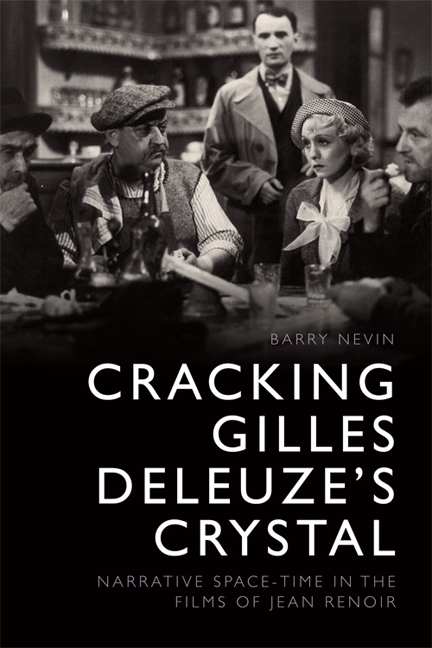Book contents
- Frontmatter
- Contents
- List of Figures
- Notes on Style
- Acknowledgements
- Preface
- Introduction
- 1 Theatrum Mundi: Framing Urban Dynamics in Renoir's Paris
- 2 From Desert to Dreamscape: Viewing Renoir's Rural Landscapes as Spatial Arenas
- 3 Portraying the Future(s) of the Front Populaire
- 4 Renoir's Crises Anti-Réalistes: Framing le Temps Gelé
- Conclusion
- Appendix: Corpus Breakdown
- Notes
- References
- Film Index
- General Subject Index
- Frontmatter
- Contents
- List of Figures
- Notes on Style
- Acknowledgements
- Preface
- Introduction
- 1 Theatrum Mundi: Framing Urban Dynamics in Renoir's Paris
- 2 From Desert to Dreamscape: Viewing Renoir's Rural Landscapes as Spatial Arenas
- 3 Portraying the Future(s) of the Front Populaire
- 4 Renoir's Crises Anti-Réalistes: Framing le Temps Gelé
- Conclusion
- Appendix: Corpus Breakdown
- Notes
- References
- Film Index
- General Subject Index
Summary
This book does not aim to provide a comprehensive account of Jean Renoir's entire body of work. It represents a conjuncture of two growing interests: first, an admiration for Renoir's portrayal of class in a number of films, especially La Chienne (1931), Le Crime de Monsieur Lange (1936), and The Golden Coach (1952); second, a growing enthusiasm for Gilles Deleuze's film philosophy, which provided me with a liberating foundation for a revised approach to the innovative narrative styles pioneered by the quintessential French auteur. Deleuze convinced me that previous studies of Renoir's films, despite their careful attention to Renoir's distinctive narrative style at each stage of his career, had not done justice to the importance of temporality to Renoir's portrayal of societal hierarchies. Remedying this oversight and building on current knowledge of Renoir's technical achievements, political engagement, and close attention to class structures, this book examines the relationship between time and space in Renoir's films, examining key aesthetic turning points, political influences, and stylistic motifs over the course of Renoir's career, among them Renoir's public commitment to the Front populaire, his post-war costume dramas, and his mise en scène of the country and the city. In each case, this book argues for the importance of Deleuze's film philosophy towards a deeper understanding of the core components of Renoir's distinctive narrative style, whilst also assessing and amending the critical limits of Deleuze's insights.
The present study insists that it is impossible to adequately consider Renoir's temporal representation of societal hierarchies by isolating them from spatiality, hence the space-time of the title. The term, defined by Russell West-Pavlov as ‘a hybrid dimension in which both space and time as relational variables together form a variable composite’, has continued to be used in physics since Albert Einstein's theories of relativity punctured the illusion of the independence of space and time.
The value of recognising the integral relationship between space and in Renoir's work is indirectly indicated by scholars of literature and film alike. Drawing on Einstein's Theory of Relativity and concurring that time is inseparable from space, Mikhaïl M. Bakhtin develops the concept of the chronotope (literally ‘time-space’ in Greek) to emphasise the ‘intrinsic connectedness of temporal and spatial relationships’ in literature.
- Type
- Chapter
- Information
- Cracking Gilles Deleuze's CrystalNarrative Space-time in the Films of Jean Renoir, pp. xiii - xivPublisher: Edinburgh University PressPrint publication year: 2018



